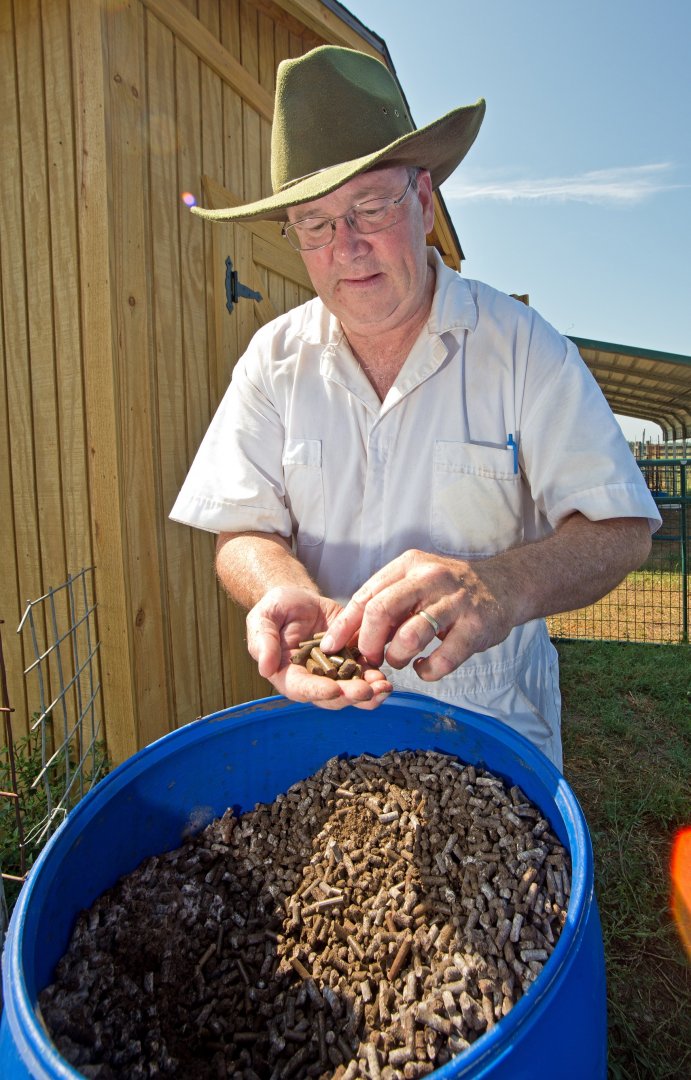In response to the small ruminant industry’s problems with anthelmintic resistant worms, Fort Valley State University teamed up with several members from national and international institutions to form the American Consortium for Small Ruminant Parasite Control (ACSRPC) in 2003. FVSU serves as the lead institution with Dr. Thomas Terrill, a FVSU professor of animal science, directing the group.
Their research methods include sustaining the management of gastrointestinal parasites in small ruminants with sericea lespedeza. This anti-parasitic plant reduces these parasites, such as Haemonchus contortus (barber pole worm), in sheep and goats. It also reduces methane, controls fly larvae in manure and prevents bloat in animals.
Terrill, who began researching sericea lespedeza in 2004, said the team’s work has helped sustain the small ruminant industry in the U.S. The FVSU forage specialist continues to help small farmers through a U.S. Department of Agriculture’s (USDA) Sustainable Agriculture Research and Education (SARE) grant, “Expanding Marketing Opportunities for Dried Nutraceutical Sericea Lespedeza Products for Small-Scale Farmers.” FVSU’s $295,000 award primarily assists small farmers in Georgia, Alabama and South Carolina.
Terrill’s outreach efforts include hosting training sessions locally and nationally to educate farmers on how they could increase their income by marketing lespedeza hay as a nutraceutical forage. He has collaborated with Dr. Niki Whitley, a FVSU animal science Extension specialist, the West Georgia Farmers’ Cooperative and a Bullock County, Alabama, seed company called Sims Brothers Inc.
Two farmers from South Carolina and South Africa have both benefited from planting lespedeza. The South African farmer heard Terrill’s presentation when he visited the area and learned about lespedeza silage, which led him to produce 500 tons for his sheep. “He has a huge sheep and cattle operation and works with limited-resource farmers in the area,” Terrill said.
South Carolina farmer Reed Edwards has raised hay for 15 years. He owns 100 acres, with 25 acres in lespedeza and 20 acres in alfalfa. Since planting lespedeza in 2007, Edwards managed to keep the leaves intact and to produce high-quality hay. He uses a humidity meter in the field to monitor the hay’s process.
“Lespedeza is the Cinderella within its family of plants,” he described. “It gets the scraps but does really well.”
Edwards commended Terrill for his expertise. Prior to meeting Terrill in 2016, Edwards first learned about his research on sericea lespedeza after reading his research papers on its health benefits. He is now able to share this knowledge with his customers.
The South Carolina farmer serves about 10 customers. He sells 1,000 bales of lespedeza and alfalfa a month from May to September. His bales of lespedeza cost $15 each, and the alfalfa is $10 or $11 a bale. Edwards’ customers report that there are now fewer health concerns with their animals, and they are saving money on medicine and treatments. He said the price for sericea lespedeza is a testament to Terrill’s research.
In addition, Terrill said the FAMACHA eyelid color scoring has been a huge success across the country. FAMACHA is a practical on-farm tool to help small ruminant producers improve their management of Haemonchus contortus infections.
The program started in 2003 following completion of a large validation study performed by the ACSRPC, according to member Dr. Ray Kaplan, professor of parasitology for the College of Veterinary Medicine at the University of Georgia.
Since 2003, people in all 50 states have purchased the FAMACHA card (50,000 total cards sold). North Carolina, Georgia, Tennessee, Iowa and Oklahoma top the list.
“The FAMACHA card could save farmers money,” Terrill said. “Eighty percent of parasites are in 20 percent of animals. If you can identify those 20 percent, you can save 80 percent on your drug bill because you do not have to debug all of your animals.”
For more information, contact Terrill at (478) 825-6814 or terrillt@fvsu.edu.

